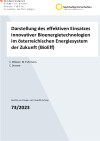Suchergebnisse
Berichte aus Energie- und Umweltforschung 11/2001 "Kulturelle" Faktoren der Wettbewerbsfähigkeit von nachhaltigen Lösungsansätzen in der Praxis

Studie über nachhaltige Lösungsansätze in der österreichischen Stoffflusswirtschaft
Berichte aus Energie- und Umweltforschung 12b/1997Erforschung der Verwendungsmöglichkeiten von Aschen aus Hackgut und Rindenfeuerungen - Anhang

Anhang zum Bericht aus Energie- und Umweltforschung 12a/1997
Berichte aus Energie- und Umweltforschung 10/1997 Verbrennungsgas-Kondensationsanlagen bei Biomasse-Fernwärmeversorgungsanlagen am Beispiel Pfarrwerfen

Beurteilung einer Kondensationsanlage in bezug auf technische Funktion, Wirtschaftlichkeit und Einfluss auf die Emissionen
Berichte aus Energie- und Umweltforschung 12a/1997Erforschung der Verwendungsmöglichkeiten von Aschen aus Hackgut und Rindenfeuerungen

Holzasche als Sekundärrohstoff mit dünge- und bodenverbessernder Wirkung
Multifunctional Energy Centre Kötschach-Mauthen - model-system to achieve energy-self-sufficiency
Development of concepts for a multifunctional Energy Centre (biomass district heating und biogas polygeneration for the supply of heat, electricity, process heat, cooling and biofuels) and for a "Öko-Energietourismus" for the community of Kötschach-Mauthen on the way to energy-self-sufficiency
Darstellung des effektiven Einsatzes innovativer Bioenergietechnologien im österreichischen Energiesystem der Zukunft (BioEff)

Die Studie zeigt Möglichkeiten und Strategien hinsichtlich des effektiven Einsatzes von innovativen Bioenergietechnologien in Österreich.
Schriftenreihe
73/2023
C. Dißauer, M. Fuhrmann, C. Strasser
Herausgeber: BMK
Deutsch, 112 Seiten
Downloads zur Publikation
Berichte aus Energie- und Umweltforschung 2/1999 Biomassebewirtschaftungskonzepte auf Basis einer Nutzenoptimierung

Ermittlung regional optimaler Biomassenutzungswege und Abschätzung ungenutzter Potentiale
KLIMUR: climate-resilient urban resource management for the case study of Zukunftshof and Rothneusiedl
For the concept of the Zukunftshof, an innovative urban agriculture area, development scenarios for an integrated energy and resource cycle system are to be developed using optimisation tools and parametric design studies. A roadmap consisting of technical concepts and a coordinated financing strategy will provide the basis for a demo project that demonstrates in practice how the Zukunftshof can be the starting point and basis for resource-efficient and climate-resilient urban development.
City Cooling - Intelligent district cooling implementation, Vienna
Development of an intelligent district cooling concept and alternative solutions for heat rejection from central absorption chillers at the example of the neighbourhood TownTown in Vienna.
Smart Grids Projects in Austrian R&D Programmes 2003-2010

This publication presents results of projects within the subject area "Smart Grids" in Austrian R&D Programmes 2003-2010. The participating research institutes and companies have achieved many remarkable and internationally acknowledged results.
Berichte aus Energie- und Umweltforschung 22/2002 Österreichisches Energieforschungs und -technologiekonzept

Ein Orientierungsrahmen für die energiebezogene Forschung und Technologie in Österreich
SUPOSS - Sustainable Power Supply for Supermarkets and Surroundings
Developing technical and business concepts and strategies for a sustainable power supply of supermarkets and local consumers - supply of heat, electric power and cooling energy on the basis of solar energy and solid biomass.
SUPOSS - Sustainable Power Supply for Supermarkets and Surroundings
Entwicklung von technischen und kommerziellen Konzepten und Strategien für eine nachhaltige Energieversorgung von Filialen des Lebensmittelhandels und angrenzender Verbraucher (Industrie & Gewerbe, Haushalte) mit Wärme, Strom und Kälte auf Basis der Energieträger Sonne und feste Biomasse.
KLIMUR - Klimaresilientes, urbanes Ressourcenmanagement am Fallbeispiel Zukunftshof und Rothneusiedl
Für das Konzept des Zukunftshofs, einer innovativen urbanen Landwirtschaft, sollen durch Optimierungstools und parametrischem Design Entwicklungsszenarien für ein integriertes Energie- und Ressourcenkreislaufsystem entwickelt werden. Eine Roadmap, bestehend aus technischen Konzepten und einer abgestimmten Finanzierungsstrategie, soll die Grundlagen für ein Demoprojekt liefern, das in der Praxis zeigt, wie der Zukunftshof Ausgangspunkt und Basis für eine ressourceneffiziente und klimaresiliente Stadtentwicklung sein kann.
scaleFLEX - Skalierbare Methode zur Optimierung der Energieflexibilität von Quartieren
Entwicklung einer dezentral organisierten Automatisierungsmethode zur Verbesserung der verbraucherseitigen Flexibilitätsoptionen von Gebäuden und Quartieren. Die dabei verwendeten datengetriebenen Algorithmen versprechen eine hohe Skalierbarkeit und damit geringe Installations- und Betriebskosten. Die entwickelte Methode wird anhand unterschiedlicher Gebäudetypen (High-Tech Bürogebäude, Low-Tech Bürogebäude, Wohngebäude) validiert.
Berichte aus Energie- und Umweltforschung 5a/1996 15 Jahre Biomasse Nahwärmenetze in Österreich

Bisherige Entwicklungen - Neue Herausforderungen
Berichte aus Energie- und Umweltforschung 5b/1996 15 Jahre Biomasse Nahwärmenetze in Österreich - Kurzfassung

Bisherige Entwicklungen - Neue Herausforderungen
Räumliche Modelle als Entscheidungsgrundlage für die Inwertsetzung regional verfügbarer Energiepotenziale zur CO2-neutralen Deckung des lokalen Wärmebedarfs
Analytische Methoden der Geoinformatik zur Modellierung regional verfügbarer, erneuerbarer Energiepotenziale für die Evaluierung von Maßnahmen zur CO2-neutralen Wärme- und Kältebereitstellung.
Spatial models as a basis of decision making for the utilisation of regionally available energy potentials for a CO2 neutral satisfaction of the local heat demand
Analytical GIS-methods to model regionally available renewable energy potentials for the evaluation of measures to achieve a CO2-neutral heating and cooling supply.
BioShip - Potentiale und Sicherstellung der Versorgung und Distribution des Bio-Energie Sektors in Österreich unter Nutzung der Binnenschifffahrt in Logistikketten
BioShip untersucht die Potentiale in der Sicherstellung von Versorgung- und Distributionslogistikketten der (Produktions-) Anlagen des biogenen Energiesektors in Österreich (Biomasse-, Biotreibstoff- und Biogasanlagen) unter Miteinbeziehung des energieeffizienten Verkehrsträgers Binnenschifffahrt.
